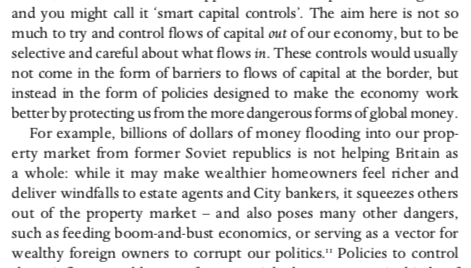
Nick Shaxson ■ Taxing foreign capital as an alternative to tariffs

Michael Pettis, a well known China-watcher and expert on global finance and macroeconomics (who has also apparently been a leading light in Beijing’s punk rock scene), has published a new article on Bloomberg entitled 5 Smart Reasons to Tax Foreign Capital.
It’s a welcome antidote to all those who feel that the route to national prosperity is through desperately throwing subsidies and tax reliefs at the world’s flighty capital. As Pettis shows, once again, this ‘competitive’ approach to global capital is a fools’ errand. Much better, he says, to tax the foreign inflows.
The article is US-focused, at a time when there’s a lot of attention on trade tariffs, but it has wider general ramifications. He notes a newly introduced US bill to “apply a variable tax on foreign purchases of U.S. dollar assets whenever foreigners direct substantially more capital into the U.S. than Americans direct abroad.”
The idea is to reduce capital inflows into the United States – which is the macroeconomic equivalent of taking loans from foreigners. As he explains:
“a country’s capital account must always and exactly match its current account, if the American capital account is balanced, then its current account must also balance, and the U.S. trade deficit would effectively disappear.”
There’s nothing wrong with trade deficits per se, but US trade deficits have been rather persistent, and potentially troublesome. The benefits of using this tool, rather than trade tariffs, are many-fold:
- The United States, like many countries, is awash in destabilising capital. Curbing this would be a benefit.
- If such a plan were flexibly designed, it could balance the current and capital accounts over the medium to long term.
- It would also contribute to financial stability, by “penali(sing) short-term and speculative inflows more than longer-term inflows into productive investment.”
- While tariffs benefit some producers at the expense of others, a tax on capital inflows benefits nearly all domestic producers, mainly at the expense of the banks. (What’s not to like?)
- Reduces distortions. “taxing capital inflows doesn’t distort the relative prices of goods and services and disrupt value chains, as tariffs do.”
- It would promote efficient capital allocation since most capital inflows are driven by fads, craziness and froth.
We could add a couple of other benefits.
7. Raising revenue. This could be transformed into productive public investment, debt reduction, or tax cuts on poorer people.
8. And finally, by reducing the relative weight in the economy, it would rein in the Finance Curse. As the Finance Curse book notes:

Related articles

UN tax convention hub – updates & resources

The Bitter Taste of Tax Dodging: Starbucks’ ‘Swiss Swindle’
Disservicing the South: ICC report on Article 12AA and its various flaws
11 February 2026

What Kwame Nkrumah knew about profit shifting
The last chance
2 February 2026

After Nairobi and ahead of New York: Updates to our UN Tax Convention resources and our database of positions
Taxing windfall profits in the energy sector
14 January 2026

The tax justice stories that defined 2025

The best of times, the worst of times (please give generously!)

Let’s make Elon Musk the world’s richest man this Christmas!


